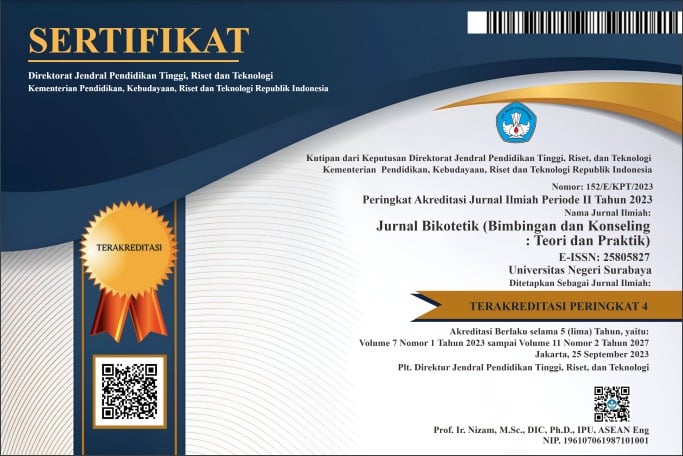THE EFFECT OF COGNITIVE RESTRUCTURING TECHNIQUES TO REDUCE SELF-HARM BEHAVIOR IN STUDENTS
DOI:
https://doi.org/10.26740/bikotetik.v9n1.p78-90Abstract
This study aims to determine the effect of cognitive restructuring techniques in reducing self-harm behavior in students. The background of the study is based on the phenomenon of increasing self-harm behavior among adolescents, which is triggered by affective and environmental factors such as emotional stress, social rejection, and negative mindsets. This study used a single subject design method with one student as the subject who had a high self-harm behavior score. The intervention was carried out through individual counseling services with a cognitive restructuring approach for six sessions. The results of the visual analysis showed a significant decrease in self-harm scores from high to low categories. Analysis within conditions and between conditions showed a negative trend, indicating the effectiveness of the intervention. In conclusion, cognitive restructuring techniques are effective in changing students' negative mindsets to be more rational and adaptive, so that they can reduce self-harm behavior. This technique is recommended for use in individual counseling services in schools.
Keywords: self-harm behavior, cognitive restructuring
Downloads
Published
How to Cite
Issue
Section
License
Copyright (c) 2025 Authors retain copyright and grant the journal the right of first publication under the Creative Commons Attribution-NonCommercial 4.0 International License (CC BY-NC 4.0). This license permits others to copy, distribute, and adapt the work for non-commercial purposes, provided the original work is properly cited.

This work is licensed under a Creative Commons Attribution-NonCommercial 4.0 International License.
 Abstract views: 302
,
Abstract views: 302
, PDF Downloads: 251
PDF Downloads: 251









